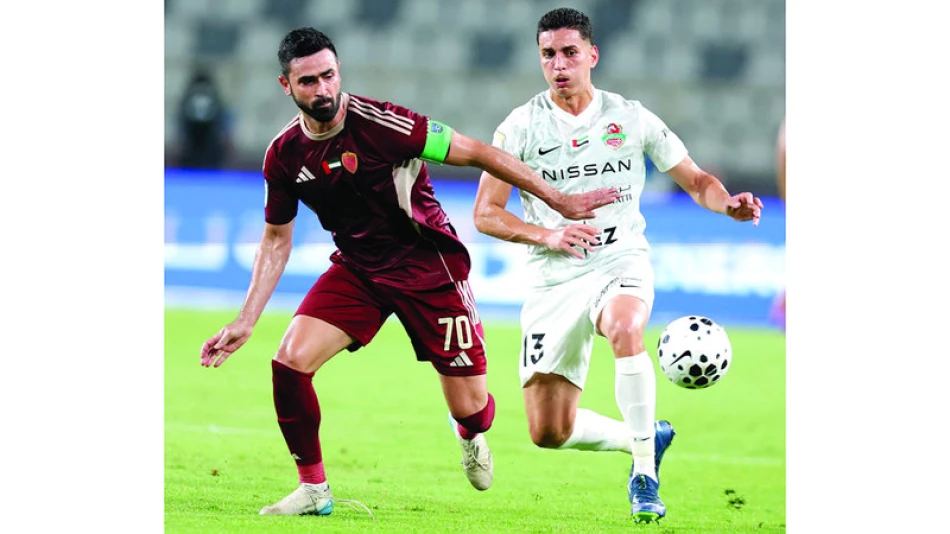
Ahli's Young Coach Hails Squad's 'Powerful' Mentality, Confident of Challenging for League Title
UAE Pro League Intensifies as Tactical Evolution Takes Center Stage
The UAE's premier football competition is witnessing a strategic renaissance as coaches embrace sophisticated tactical approaches and stronger squad depth reshapes the competitive landscape. A goalless draw between Al Wahda and Shabab Al Ahli has revealed how Portuguese coaching expertise is elevating the technical standards of Emiriti football, with both managers highlighting tactical flexibility and squad development as key differentiators in what promises to be the league's most competitive season yet.
Portuguese Tactical Philosophy Transforms UAE Football
Paulo Sousa, Shabab Al Ahli's Portuguese manager, demonstrated the kind of in-game tactical sophistication typically associated with Europe's top leagues. His decision to pull the attacking line deeper during the match exemplified modern football's emphasis on fluid formations and real-time adjustments.
"The tactical decision we implemented during the match, when we stepped back with the attacking line, was interpreted brilliantly by the players," Sousa explained. This approach enhanced both defensive transitions and attacking capabilities, particularly through strategic second-half substitutions that saw Moanes Dabour deployed in advanced positions.
The performance of Serbian newcomer Nemanja Maksimović earned particular praise from Sousa, who described his debut as "outstanding" and predicted he would be a "strong addition" throughout the season. Such targeted recruitment reflects the league's growing sophistication in player acquisition.
Al Wahda's Resurgence Challenges Historical Patterns
José Morais, Al Wahda's Portuguese coach, emphasized that modern football transcends historical precedents. His team's ability to contain Shabab Al Ahli—breaking a pattern of home defeats at Al Nahyan Stadium—signals a tactical maturity that could reshape traditional power dynamics in Emirati football.
"Football doesn't recognize the past, only what happens on the pitch," Morais stated, highlighting how strategic planning can overcome historical disadvantages. His focus on control, progression, and chance creation reflects contemporary coaching methodologies that prioritize process over results.
Investment in Quality Drives Competitive Balance
Both coaches acknowledged that strategic reinforcements have elevated multiple clubs' competitive capacity. Al Wahda's "strong signings" and improved squad depth exemplify how targeted investment is creating a more balanced league structure, moving away from the traditional dominance of two or three clubs.
Market Implications for Gulf Football
The UAE Pro League's tactical evolution positions it favorably within the broader Gulf football ecosystem. As Saudi Arabia's Public Investment Fund transforms the Saudi Pro League through massive signings, the UAE's focus on coaching quality and tactical sophistication offers an alternative development model.
This approach mirrors successful leagues like Portugal's Primeira Liga, where tactical innovation and coaching excellence compensate for lower transfer budgets compared to Europe's elite competitions. For broadcasters and sponsors, more competitive matches enhance the league's commercial appeal.
Regional Competition Intensifies
The UAE's emphasis on Portuguese coaching expertise—with both managers representing this trend—reflects broader regional competition for football credibility. While Qatar leveraged World Cup hosting and Saudi Arabia pursues star signings, the UAE is building sustainable competitive infrastructure through coaching quality.
Season Outlook: Unprecedented Competitive Depth
Morais's observation that "five or six teams compete strongly" each season, with this year being "no exception," understates the current competitive landscape. Enhanced squad depths, tactical sophistication, and strategic recruitment suggest the title race could extend deeper into the season than recent years.
The red card incident involving Renan Victor that affected Shabab Al Ahli's game plan demonstrates how marginal factors could prove decisive in such a balanced competition. Teams with superior tactical flexibility and squad depth will likely benefit from these unpredictable moments.
As the UAE Pro League enters its third decade, the integration of Portuguese tactical philosophy with local talent development creates a compelling blueprint for sustainable football growth in the Gulf region. The early evidence suggests this season will validate the strategic approach of prioritizing coaching quality over headline signings.
Most Viewed News

 Sara Khaled
Sara Khaled






